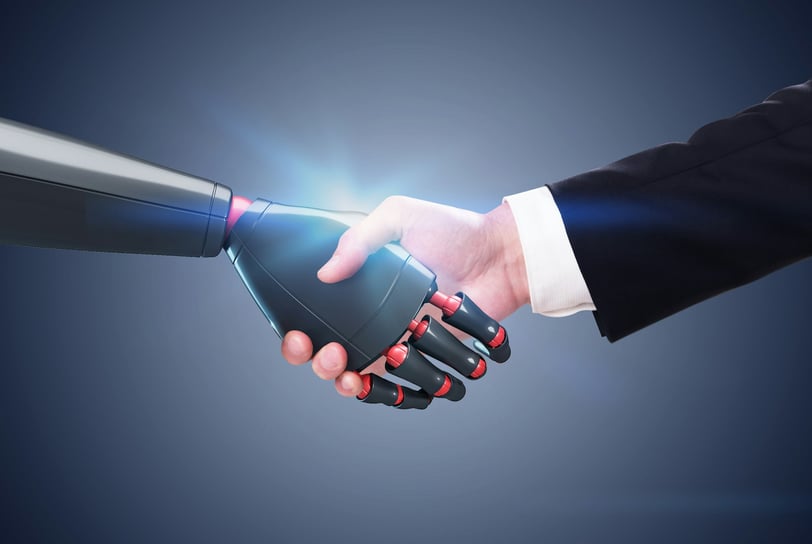AI and ML for Small Businesses: What You Need to Know
Artificial intelligence (AI) and machine learning (ML) are innovative technologies that can assist small businesses in growing and succeeding in the modern digital era. This post explores the benefits and challenges associated with AI and ML.
7/18/20233 min read


Artificial Intelligence (AI) and Machine Learning (ML) are often used interchangeably, but they are different. AI is the broader term for the ability of machines or systems to perform tasks that normally require human intelligence, such as reasoning, learning, decision-making, and perception.
ML is a subset of AI focusing on the methods and algorithms that enable machines or systems to learn from data and improve their performance without explicit programming. ML is one of the main ways to achieve AI, but there are others. Other branches of AI include expert systems, natural language processing, computer vision, robotics, and more.
AI and ML can offer many advantages for small businesses, such as:
Improving Customer Service and Satisfaction
Small businesses can use AI and ML to enhance their customer service. Chatbots, voice assistants, and recommendation systems can help them provide personalized and efficient customer support. These technologies also allow businesses to gather and analyze customer feedback and behavior, which can help improve their products, services, and marketing strategies.
Enhancing Productivity and Efficiency
AI and ML can help small businesses automate repetitive, tedious, or complex tasks, such as accounting, invoicing, scheduling, inventory management, and fraud detection. By analyzing data, AI and ML can provide insights, predictions, and suggestions to help optimize processes, resources, and performance, leading to increased efficiency and productivity.
Increasing Innovation and Competitiveness
Small businesses can use AI and ML to create new products, services, or features that meet customer needs or solve their problems. These technologies can also be used to find new markets, opportunities, or niches by analyzing data trends and patterns. AI and ML can also help small businesses stand out from their competition by offering unique value propositions or customer experiences.
However, AI and ML also pose some challenges and risks for small businesses, such as:
Cost and Complexity
Implementing AI and ML technologies can be costly and complex, requiring hardware, software, data, talent, and training investments. This can be incredibly challenging for small businesses as they may not have the financial resources or technical know-how to do so effectively and securely. Integrating these technologies with existing systems or platforms can also pose difficulties for small businesses.
Ethical and Legal Issues
Artificial Intelligence and Machine Learning have raised many questions about how personal information is kept private and secure, who owns it, whether people have given their permission for it to be used, who is responsible if something goes wrong, and whether any unfair treatment or prejudice is involved. These are all complex issues that even small businesses may have to deal with, especially if they are using these technologies in ways that raise ethical concerns.
Social and Environmental Impacts
AI and ML have social and environmental implications that may affect small businesses and the people involved with them. For example, these technologies may create or eliminate jobs and change the kinds of jobs available and the skills needed for those jobs. They can also affect how people interact with each other, how customers behave, and whether things have positive or negative effects on the world around us.
As a small business owner, understanding how AI and ML can benefit your business is important. While these technologies offer significant advantages, adopting them responsibly and strategically is equally important.
Here are some best practices to consider when leveraging AI and ML for your business:
Define Clear Goals and Objectives
Small businesses can maximize the benefits of AI and ML by using them to solve problems or seize opportunities. However, it's vital to define clear goals and objectives to ensure these technologies are used effectively.
Assess Their Readiness and Capabilities
Small businesses should evaluate their current situation and resources regarding data availability and quality, infrastructure and tools compatibility and accessibility, talent availability, skills gap, and budget feasibility.
Choose the Right Solutions and Partners
Small businesses must find the right people and solutions to help them achieve their goals. This means doing some research and getting help from experts, vendors, or partners who can help them safely and efficiently implement and manage these tools.
Monitor and Evaluate the Results and Impacts
Small businesses need to take a proactive approach to AI and machine learning. It's important to monitor how these technologies are used and their impacts on customers, employees, partners, competitors, and society. By analyzing the outcomes and effects, you can adjust your strategies if needed, demonstrating your commitment to responsible use.
Conclusion
Artificial Intelligence and Machine Learning are not just buzzwords or fads. They are innovative technologies that can help small businesses grow and succeed in the modern digital era. However, these technologies also come with challenges and risks that need to be addressed carefully and thoughtfully. Small businesses that use these technologies responsibly and ethically can gain a competitive advantage and create value for themselves and their stakeholders.
Albright Administration
Remote Office and Business Support
Philadelphia, PA 19106 U.S.A.
(800) 854-4709 toll free
(267) 388-1444 call or text
mail@albrightadministration.com
Connect with us
Since 1991
Company
Services
© Anne Albright, Albright Administration.
All rights reserved.
Recommended by locals on Alignable


